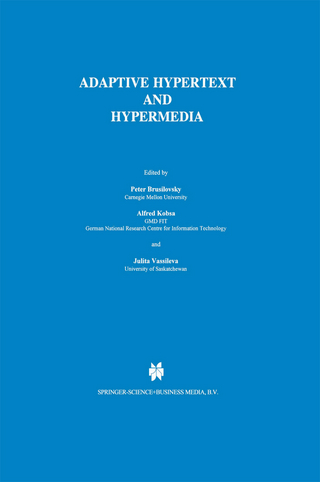
2010, ISBN: 9048149444
[EAN: 9789048149445], Neubuch, [SC: 0.0], [PU: Springer Netherlands], COMPLEXITY; INFORMATIONRETRIEVAL; MODELING; NAVIGATION; USERMODELING, Druck auf Anfrage Neuware -Hypertext/hypermedia… Meer...
| ZVAB.com AHA-BUCH GmbH, Einbeck, Germany [51283250] [Rating: 5 (von 5)] NEW BOOK. Verzendingskosten:Versandkostenfrei. (EUR 0.00) Details... |

ISBN: 9789048149445
Hypertext/hypermedia systems and user-model-based adaptive systems in the areas of learning and information retrieval have for a long time been considered as two mutually exclusive approa… Meer...
| Indigo.ca new in stock. Verzendingskosten:zzgl. Versandkosten., exclusief verzendingskosten Details... |

ISBN: 9789048149445
Hypertext/hypermedia systems and user-model-based adaptive systems in the areas of learning and information retrieval have for a long time been considered as two mutually exclusive approa… Meer...
| Indigo.ca new in stock. Verzendingskosten:zzgl. Versandkosten., exclusief verzendingskosten Details... |

ISBN: 9789048149445
Paperback, [PU: Springer], Hypertext/hypermedia systems and user-model-based adaptive systems in the areas of learning and information retrieval have for a long time been considered as … Meer...
| BookDepository.com Verzendingskosten:Versandkostenfrei. (EUR 0.00) Details... |

2010, ISBN: 9789048149445
Buch, Softcover, Softcover reprint of hardcover 1st ed. 1998, [PU: Springer], Springer, 2010
| lehmanns.de Verzendingskosten:Lieferbar. (EUR 0.00) Details... |


2010, ISBN: 9048149444
[EAN: 9789048149445], Neubuch, [SC: 0.0], [PU: Springer Netherlands], COMPLEXITY; INFORMATIONRETRIEVAL; MODELING; NAVIGATION; USERMODELING, Druck auf Anfrage Neuware -Hypertext/hypermedia… Meer...
ISBN: 9789048149445
Hypertext/hypermedia systems and user-model-based adaptive systems in the areas of learning and information retrieval have for a long time been considered as two mutually exclusive approa… Meer...
ISBN: 9789048149445
Hypertext/hypermedia systems and user-model-based adaptive systems in the areas of learning and information retrieval have for a long time been considered as two mutually exclusive approa… Meer...

ISBN: 9789048149445
Paperback, [PU: Springer], Hypertext/hypermedia systems and user-model-based adaptive systems in the areas of learning and information retrieval have for a long time been considered as … Meer...

2010, ISBN: 9789048149445
Buch, Softcover, Softcover reprint of hardcover 1st ed. 1998, [PU: Springer], Springer, 2010
Bibliografische gegevens van het best passende boek
| auteur: | |
| Titel: | |
| ISBN: |
Gedetalleerde informatie over het boek. - Adaptive Hypertext and Hypermedia
EAN (ISBN-13): 9789048149445
ISBN (ISBN-10): 9048149444
Gebonden uitgave
pocket book
Verschijningsjaar: 2010
Uitgever: Springer
264 Bladzijden
Gewicht: 0,404 kg
Taal: eng/Englisch
Boek bevindt zich in het datenbestand sinds 2012-06-08T20:47:33+02:00 (Amsterdam)
Detailpagina laatst gewijzigd op 2023-02-21T18:04:58+01:00 (Amsterdam)
ISBN/EAN: 9789048149445
ISBN - alternatieve schrijfwijzen:
90-481-4944-4, 978-90-481-4944-5
alternatieve schrijfwijzen en verwante zoekwoorden:
Auteur van het boek: kobs, peter alfred, peter may, brusilov, peter vassilev
Titel van het boek: hypertext hypermedia
Gegevens van de uitgever
Auteur: Peter Brusilovsky; Alfred Kobsa; Julita Vassileva
Titel: Adaptive Hypertext and Hypermedia
Uitgeverij: Springer; Springer Netherland
252 Bladzijden
Verschijningsjaar: 2010-12-01
Dordrecht; NL
Gedrukt / Gemaakt in
Taal: Engels
106,99 € (DE)
109,99 € (AT)
118,00 CHF (CH)
POD
X, 252 p.
BC; Hardcover, Softcover / Informatik, EDV/Informatik; Natürliche Sprachen und maschinelle Übersetzung; Verstehen; Hypermedia; complexity; information retrieval; modeling; navigation; user modeling; Natural Language Processing (NLP); User Interfaces and Human Computer Interaction; Multimedia Information Systems; Information Storage and Retrieval; Mensch-Computer-Interaktion; Grafische und digitale Media-Anwendungen; Informationsrückgewinnung, Information Retrieval; Data Warehousing; BB
1. Methods and Techniques of Adaptive Hypermedia.- 2. Adaptive Hypertext Navigation based on User Goals and Context.- 3. Metadoc: An Adaptive Hypertext Reading System.- 4. User Modelling in the Interactive Anatomy Tutoring System ANATOM-TUTOR.- 5. Hypadapter: An Adaptive Hypertext System for Exploratory Learning and Programming.- 6. A Glass Box Approach to Adaptive Hypermedia.- 7. User-Centered Indexing for Adaptive Information Access.- 8. A Task-Centred Approach for User Modeling in a Hypermedia Office Documentation System.Andere boeken die eventueel grote overeenkomsten met dit boek kunnen hebben:
Laatste soortgelijke boek:
9789401706179 Adaptive Hypertext and Hypermedia (H. Schluter)
< naar Archief...

